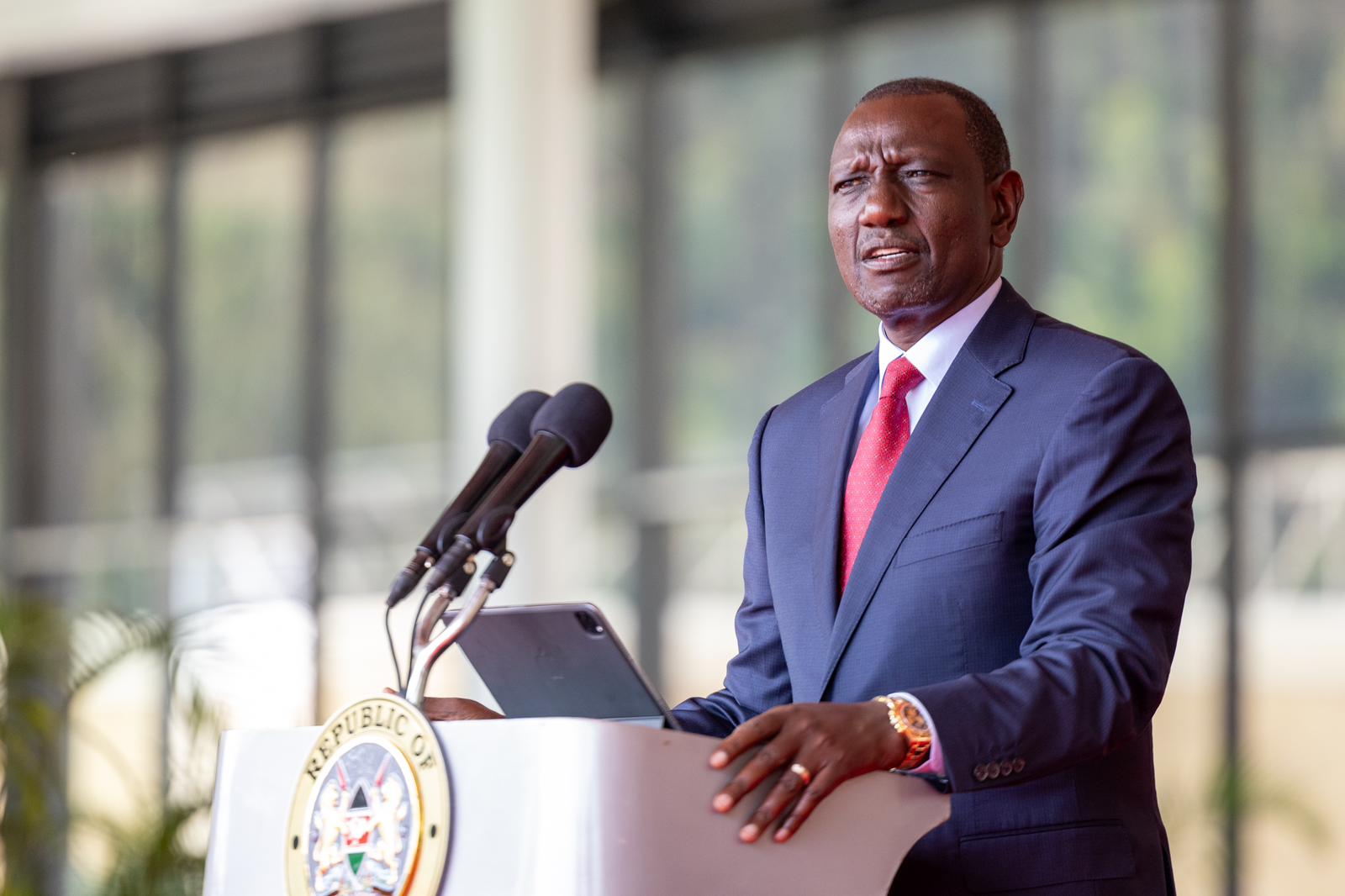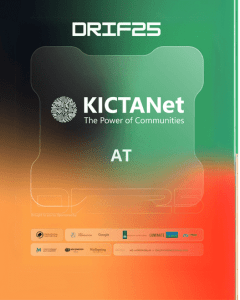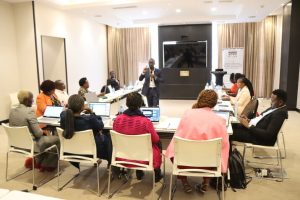For the attention of His Excellency President William Ruto, President of the Republic of Kenya
CC: Hon. John Tanui, Principal Secretary, Ministry of Information, Communication and the Digital Economy; Hon. Patrick Mariru, Principal Secretary, Ministry of Defence; and Hon. Raymond Omollo, Principal Secretary, Ministry of Interior and Coordination of National Government.
Re: Kenya’s government must cease attacks on protesters’ digital rights, ensure public safety and the rule of law
We the undersigned organisations write to you regarding the alarming deteriorating human rights situation in Kenya. During his inauguration on 13 September 2022, President William Ruto vowed that his government would not retaliate against dissenting voices. In a further show of his commitment to the rule of law, he disbanded the Special Services Unit, a corrupt and unaccountable law enforcement agency once notorious for enforced disappearances and extrajudicial killings. However, the recent actions of Kenya’s security authorities in response to online organising and protests opposing the country’s now-withdrawn Finance Bill 2024, show that the Kenyan government has failed to uphold its international human rights obligations, including specific commitments during the 2020 Universal Periodic Review. During this review, Kenya accepted recommendations to conduct independent and impartial investigations into reports of unlawful use of force and extrajudicial killings by police, uphold the right to freedom of expression, and ensure the safety of human rights defenders. The government must therefore act now to ensure prevention of further abuses and ensure access to justice for victims of human rights violations.
Background
The Finance Bill, 2024 was tabled in parliament on 9 May 2024 and faced strong opposition from members of the public and other stakeholders during the public participation stage. This was due to the threats that it posed to data protection, the business environment, and a choking cost of living crisis that would be worsened by increased taxes. While President Ruto announced the withdrawal of the contentious bill on 26 June 2024, the actions of state authorities prior to and after this decision have created a very chilling environment for citizens, human rights defenders, journalists, and political dissidents opposed to the bill and critical of the government’s actions.
Freedom of peaceful assembly online and offline
Kenya’s constitution guarantees the right to peaceful assembly, demonstration, picketing, and petition in Article 37; additionally, the International Convention on Civil and Political Rights (ICCPR), to which Kenya is a party, guarantees this same right in Article 21. The Constitution of Kenya goes further to prescribe in Articles 24 and 25 the extent to which fundamental rights can be limited and rights from which there can be no derogation.
The UN Human Rights Committee said in its General Comment n° 37 that Article 21 of the International Covenant on Civil and Political Rights (ICCPR) “protects peaceful assemblies wherever they take place: outdoors, indoors and online; in public and private spaces.” In addition, the Committee — the only official interpreter of the ICCPR — emphasised the online dimension of this right, noting that “many associated activities happen online or otherwise rely on digital services. Such activities are also protected under Article 21. States parties must not, for example, block or hinder Internet connectivity in relation to peaceful assemblies.”
In Kenya, concerns about the Finance Bill’s potential impact on the cost of living caused an uproar in the nation, with members of the public urging the government to reject the bill. Since 18 June, people in Kenya have protested peacefully both online and offline in opposition to the punitive bill. The internet has enabled protesters to assemble online by:
- Using hashtags such as #RejectFinanceBill, #RutoMustGo, and #OccupyChurches to mobilise for protests and demand accountability in governance and for human rights violations;
- Using X Spaces to assemble online and discuss national issues; and
- Using social media to crowdfund for protesters that have been arrested, injured, or killed.
These commendable actions of civic engagement have however been met with severe repression by the government. Since 19 June 2024, authorities have been targeting and reportedly abducting social media activists, including one of the hosts of popular X Spaces.
These threats to freedom of assembly have extended offline. On 18 June 2024, the Regional Police Commander of Nairobi banned protesters from taking to the streets, in clear violation of the right to freedom of assembly, and in excess of his powers as provided by the Public Order Act. Additionally, since the first day of the protests, security personnel have subjected protesters to excessive and disproportionate force, leading to the death of at least 39 people, injury of 361 people, and the arrest of 627 protesters as recorded by the Kenya National Commission on Human Rights (KNCHR). KNCHR further noted that the treatment of protesters by security authorities amounted to torture, in violation of various laws, such as Articles 25 and 29 of the Constitution of Kenya, the Prevention of Torture Act, and Article 7 of the ICCPR.
State officials’ decades-old track record of profiling peaceful protesters as “violent” and “criminals,” and commending police actions, as President Ruto has repeated recently, has entrenched the abuse of power and impunity of the police when dealing with protesters. The government’s decision to deploy the Kenya Defence Forces in response to supposed “prevailing threats to national security planned and orchestrated through various platforms in cyberspace,” threatens the ability of the public to protest online and offline. It is an unnecessary escalation that has been criticised and challenged at the High Court, as it blurs the lines between military and police functions. Such deployment could worsen already existing oversight challenges, and put protesters at risk, in an environment where the president and public officials have denied or disputed the existence and extent of extrajudicial killings despite reports by various groups indicating otherwise. This is in addition to defending the growing practice of state-led abductions that have been criticised by members of his own administration.
Freedom of expression and network disruptions
Since the Finance Bill was first proposed, people in Kenya used social media and the internet to raise awareness and start conversations on excessive government expenditure. During the protests, social media played a crucial role in raising the alarm about the arbitrary arrests, as well as mobilising medical and legal aid for protesters. However, authorities in Kenya have used unlawful means to stifle the civic space during this critical time.
Authorities are targeting dissenting voices including content creators, doctors, activists, and lawyers on social media with threats, intimidation, and unlawful abduction. Security personnel also reportedly acted violently against journalists covering the protests, and briefly detained members of the press. As of 30 June 2024, Kenya’s Police Reforms Working Group has documented that authorities have abducted and detained at least 32 people in relation to the protests. As was seen during the arbitrary arrest of Hon. Alfred Keter and Shadrack Kiprono, these individuals were abducted by security officials in civilian clothing, forced into unmarked vehicles, driven and detained incommunicado in unidentified locations, and later taken to police stations outside the jurisdiction of where they were taken, according to documentation and reporting. Some have been reportedly denied access to legal counsel and not informed of their rights in contravention of the constitution. Others have allegedly been dumped in remote areas upon release, after being subjected to mental and physical trauma.
President Ruto has defended the arbitrary arrests, stating that the arrests are legally instituted. However, as noted by the Chief Justice of Kenya, these actions violate the rights of arrested persons as provided in Article 49 of the Constitution of Kenya.
Authorities’ abuse of the law and the disproportionate use of force creates a chilling effect that muzzles political dissent and impedes people’s ability to enjoy their rights, participate in civic engagement, hold authorities accountable, and shed light on human rights violations.
These violations are further worsened by network disruptions. It is important to note, per Access Now’s 2023 #KeepItOn report, that protests were the main trigger for shutdowns in Africa, with 10 out of 17 internet shutdowns flowing from government efforts to quell protests and stifle dissent. On 25 June, measurements from the Internet Outage Detection and Analysis (IODA) and Cloudflare revealed network connectivity disruptions in Kenya. Telcos such as Safaricom and Airtel have claimed that the outage was caused by undersea cable cuts. Of concern, is that the disruptions were concentrated during the height of the protests on 25 June and severely impacted internet, social media, and messaging access not only in Kenya but also in neighbouring Uganda and Burundi. Social media platform X was also rendered inaccessible for users in Kenya for several hours. Access to e-commerce platforms and mobile money services was also affected. Several global and local civil society organisations have pointed out that it is highly likely that the disruptions were caused intentionally, in violation of international human rights law and norms.
Right to privacy
During the reported arbitrary detentions by security authorities, victims have revealed that their phones and computers have been unlawfully confiscated by authorities. These reports further indicate that the victims have been ordered to unlock all their devices during detention, and were interrogated about their activity on social media platforms, as well as their contributions to the protests and links to other online activists, and probed for information on funders of the protests. While Section 51 of the National Police Services Act obliges police officers to investigate crimes, they must follow due process and the letter of the law. Additionally, constitutional courts in Kenya have found that searches without warrants must be carried out with due regard to the constitutional right to privacy and following due process (see Samura Engineering and 10 Others v Kenya Revenue Authority and Samson Mumo Mutinda vs Inspector General National Police Service and 4 Others). The methods of investigation observed by security authorities in this case are therefore a clear violation of procedure provided for by law. They are further in violation of the right to privacy as provided for in Article 31 of the Constitution of Kenya and the Data Protection Act, 2019 which protects against infringement of private communications and unlawful seizure of their possessions.
These risks are further exacerbated by authorities’ access to surveillance technologies. A 2021 report by the University of Toronto’s Citizen Lab revealed that security authorities in Kenya had deployed technology from the Israeli intelligence firm, Circles, which enables authorities to intercept calls, text messages, and locations. A previous report by the Citizen Lab in 2013 revealed that Blue Coat Device appliances had been found in government networks in Kenya. This technology filters application traffic by content category in real-time, which enables authorities to surveil people’s interactions on social media platforms. Procurement notices from the Kenya Power and Lighting Corporation and the Competition Authority of Kenya have also revealed that the government of Kenya may have access to Cellebrite UFED, hacking software that has been flagged for its enabling of human rights violations across the globe. Provisions introduced by the 2020 Statute Law Miscellaneous Amendment Act, additionally give powers to the Cabinet Secretary of Interior to access data from any phone or computer without appropriate checks and balances, in violation of international human rights law.
Our demands
As noted by Kenyan civil society organisations, President Ruto must take accountability for the gross human rights violations committed since 18 June 2024. Concerningly, the president’s recent statements evidence a refusal to hold the officials within his administration accountable for the excessive use of force, and reported arbitrary arrests, enforced disappearances, and extrajudicial killings of protesters and political dissidents. This refusal continues to undermine the rule of law, constitutionalism, human rights and good governance in a country previously considered a democratic stronghold in the region. It also impedes the ability of victims of state brutality to access justice and efforts to prevent future violations.
More importantly, these violations not only impact Kenya’s human rights record but have also eroded public trust in the government. Whereas Kenya is a signatory to various international human rights instruments including the Universal Declaration of Human Rights (UDHR) and the ICCPR, it is our view that the government of Kenya is failing to meet these obligations.
Thus, we recommend that the government:
- Take urgent and concrete measures to ensure absolute protection of fundamental rights and freedoms, including freedom of expression and access to information, association and peaceful assembly, and privacy and data protection, online and offline for all;
- Ensure that all credible reports of killings of demonstrators, torture and ill-treatment of detainees, and enforced disappearance are investigated;
- Release those arbitrarily detained to ensure procedural fairness, and hold perpetrators accountable through fair trials in line with constitutional standards;
- Refrain from shutting down or disrupting internet and telecommunications services, particularly during protests or in times of mass unrest;
- Guarantee access to the country for international human rights and accountability mechanisms such as the African Commission on Human and Peoples’ Rights, as well as the United Nations Human Rights Council’s Special Procedures, to independently investigate the reports of human rights violations since 18 June 2024.
- KNCHR to commission and publish independent transparency reporting to investigate the cause of the network disruptions documented on 25 June 2024; and
- KNCHR to commission and publish independent transparency reporting to investigate and document unlawful and warrantless methods of data collection deployed by authorities to target peaceful protesters, such as arbitrary device searches, accessing of mobile service subscribers’ data from telcos without judicial oversight, and the use of targeted surveillance technologies by security authorities.; and
Signed,
- Access Now
- AfricTivistes
- ARTICLE 19 – Eastern Africa
- ARTICLE 19 – West Africa
- Bloggers Association of Kenya (BAKE)
- Centre for Human Rights, University of Pretoria
- Collaboration on International ICT Policy for East and Southern Africa (CIPESA)
- Democracy Without Borders – Kenya
- Digital Grassroots (DIGRA)
- Global Digital Inclusion Partnership (GDIP)
- Haki na Sheria
- Human Rights Journalists Network Nigeria
- Innovation for Change (I4C) South Asia
- International Press Institute
- JCA-NET (Japan)
- Kenya Human Rights Commission
- KICTANet
- Life campaign to abolish the death sentence in Kurdistan
- Organization of the Justice Campaign
- Paradigm Initiative (PIN)
- PEN America
- Pollicy
- Sassoufit Collective (Republic of the Congo)
- The Nubian Rights Forum – Kenya (NRF)
- The Tor Project
- West African Digital Rights Defenders coalition
- Youths and Environmental Advocacy Centre (YEAC-Nigeria)
- Zaina Foundation
![]()




